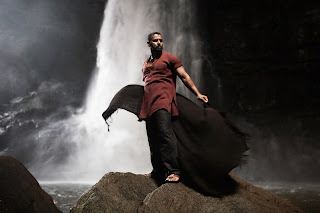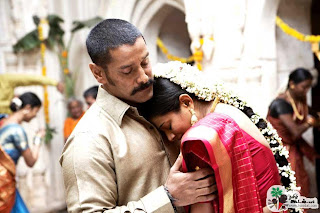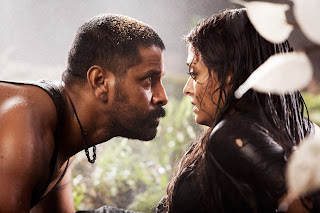
Title: Ravan (Hindi), Ravanan (Tamil, Telegu) Year: 2010 Cast: Vikram, Prithvi, Aishwariya, Prabhu, Govinda, Priyamani, Abhishek.
When Ravanan (2010) and Ravan (2010) were released earlier this year, I saw Ravanan first (my first Tamil film in a theatre- yay). Unfortunately, the theatre did not have subtitles, and I saw it with my best friend and sister, with all three of us clueless re: the language. And yet, we understood and loved the movie- the crew, especially Vikram were that good. In fact the movie made me a Chiyaan Vikram fan, and I followed it up with other movies by him.
I had originally planned to watch Ravan immediately following Ravanan, but having been so favorably impressed it Ravanan, didn’t think it was fair to compare it with its Hindi counterpart quite so soon, especially since Ravan had terrible review (‘cos what do critics know? Nothing!).
So I gave myself time- a quarter of a year in fact, before I watched Ravan, when all the negative publicity had died and everyone (or mostly everyone) had forgotten about both movies.
The Ramayana
Ravanan/Ravan is the Ramayana as interpreted by Mani Ratnam in modern times, with Ravan as the sympathetic character, as opposed to Ram. In the epic, Ram and Sita are out in the wilds, when Surpnakha, Ravan’s sister flirts with Ram, and after being spurned multiple times, gets her ears and nose cut off by Luxman (Ram’s brother). She flees to Lanka, where Ravan is king and complains. Ravan abducts Sita and keeps her in captivity for 14 years. Ram eventually gathers forces and makes it to Lunka, kills Ravan (Dussehra, as celebrated) and makes it back with Sita, victorious (Diwali, as celebrated).
The story
The movie/s have the same story, where Ram’s character is called Dev (God), Sita is Ragini (Song) and Ravan is Beera (Brave). In the modern setting, Dev is the Superintendent of Police, Ragini is his wife and Beera the Don of a backwaters region. Dev tries to capture Beera, but continuously fails. Dev finally manages to crash Beera’s sister’s wedding, where he shoots Beera in the neck and captures his sister. In the mayhem that follows, Beera’s gang spirits him away, but unfortunately leave his sister behind, assuming her new husband would take care of her. He doesn’t. And she gets raped by Dev’s subordinates in the police force. The sister gets back to her village eventually, and kills herself there. Beera in vengeance abducts Ragini, and Dev rushes in to the backwaters to find and capture Beera. Mani Ratnam gives food for thought here- if the Ramayana is not merely fiction but history, it doesn’t tell us what happened to Surpnakha after she came back to Lunka and complained to her Brother. She may have indeed killed herself. The cutting of one’s nose is spoken symbolic of deep shame- could it not mean actual rape, the greatest heroes of Hindu mythology may not be heroes? It is useless to speculate, but we know at least that the fair-skinned Aryans (the Hindu clan, of which Ram was a part) when they invaded India, did push back the dark-skinned, curly-haired Dravidians to southern India and Lunka (of which Ravan was a part). The Aryans vilified the Dravidians as Rakshasas (demons) in all their epics/documentation, so speculation as to their veracity is legitimate.
The characters
 Beera is enormously effective when played by Vikram (Ravanan), who grants the character the seriousness and anger it needs, even in moments of relative levity. His eyes smolder with anger (at the police), hopelessness (when his sister comes back), affection (when he is interacting with his sister in the beginning), awe (his amazement at Ragini’s bravado). Vikram sells the character completely to the viewer; he becomes Beera, and you know that’s what he was meant to be. And therein lies the biggest flaw of the Hindi version, as correctly unloved by the critics. Abhishek (Ravan) is no Beera. The look in his eyes varies from the manic (when he is angry) to almost gleeful, when he should look anything but that- its obvious that the Director got him to play Beera so that he could exploit (1) his pairing with real life wife Aishwariya, (2) Abhishek’s own Hindi film fan following, (3) an extension of his character from Yuva (2004). It doesn’t work, and Abhishek appears to have assumed the making of the movie as a chance to hang out with his wife. It is a sad disappointment from a good, but fantastically lazy actor.
Beera is enormously effective when played by Vikram (Ravanan), who grants the character the seriousness and anger it needs, even in moments of relative levity. His eyes smolder with anger (at the police), hopelessness (when his sister comes back), affection (when he is interacting with his sister in the beginning), awe (his amazement at Ragini’s bravado). Vikram sells the character completely to the viewer; he becomes Beera, and you know that’s what he was meant to be. And therein lies the biggest flaw of the Hindi version, as correctly unloved by the critics. Abhishek (Ravan) is no Beera. The look in his eyes varies from the manic (when he is angry) to almost gleeful, when he should look anything but that- its obvious that the Director got him to play Beera so that he could exploit (1) his pairing with real life wife Aishwariya, (2) Abhishek’s own Hindi film fan following, (3) an extension of his character from Yuva (2004). It doesn’t work, and Abhishek appears to have assumed the making of the movie as a chance to hang out with his wife. It is a sad disappointment from a good, but fantastically lazy actor.
Ragini is played by Aishwariya in both the Tamil and Hindi versions, and she does remarkably well. Her voice is familiarly screechy in the Hindi version, but not in Tamil; which makes me believe that her voice was dubbed in Tamil, despite reports to the contrary. Her Ragini is sensitive and well-realized- she speaks little, and largely emotes with her eyes , which always works for her. I do think her character gets shortchanged though- I’d like to have seen her, in the end, truly walk away from Dev, in defiance of the mythological version.
Dev is highly effective when played by Prithvi (Tamil), and falters when played by Vikram (Hindi). This was surprising, since Vikram had proved to me he could act as Beera. His Dev is almost one-dimensional; and the Director effectively undercuts his effectiveness by having him wear Raybans almost throughout the movie. We have no idea of how Vikram’s Beera is feeling most of the time, since he speaks little and we cant see his eyes- and so he appears almost robotic. It may also be a case of miscasting- realizing Vikram’s potential, Mani may have decided to cast him as Dev, so that he could exploit (1) his acting skills (2) get Vikram’s Tamil/Telegu/Kannada fans to see the Hindi version. Massive fail. On the other hand, Prithvi’s Dev, is precise and calculative even when hampered by Raybans (which don’t show up as often in the Tamil version anyway). He makes you believe that he does have genuine affection for Ragini, and yet his career comes first, and he will do anything to get vengeance. Prithvi ensures that we know that Dev treats Ragini like a beloved toy- and Beera must pay for taking her away.
 The supporting cast is great- Priyamani (whom I absolutely must see more of soon), Prabhu (always brilliant, and he and Vikram are a great team always), Govinda and Ravi Kissan. Supporting actors at their finest, someone was doing great casting here (why choose Abhishek then? Amitabh twisted your arm? [shrug]).
The supporting cast is great- Priyamani (whom I absolutely must see more of soon), Prabhu (always brilliant, and he and Vikram are a great team always), Govinda and Ravi Kissan. Supporting actors at their finest, someone was doing great casting here (why choose Abhishek then? Amitabh twisted your arm? [shrug]).
I really enjoyed the choreography, especially the sequence of Priyamani’s romance, engagement and wedding. Very deft, smart and yet very earthy. And the cinematography and sets are brilliant, with the huge statue very reminiscent of the Aawara statues (tell me you didn't think of that even once).
Grumblings
1 Great songs- though “Ranjha Ranjha” in the Hindi version makes no sense at all. Beera and Ragini are almost sparring there, and there is no romance at all (which the song invokes) while there is chemistry and sexual tension (which the song does nothing for). A waste of a good song.
2 One quibble on the script- in both versions, Ragini jumps off a high cliff/waterfall, hits a tree stump and then falls into the water, and Beera jumps after her. After a brief interlude, they climb back up using tree vines- which is an amazing display of balance and stamina- they may be athletic (he- a backwater fighter, she- a dancer), but they aren’t supposed to be Olympic champions.
Conclusion
In the end, it is amazing how much the movie disappoints in Hindi and how brilliant it is in Tamil (and Telegu). I sincerely believe that Mani Ratnam needs to take a serious look at his roots. He gave us Roja (1992) and Bombay (1995), which were made in Hindi and Tamil at the same time, with the same cast in both versions- Roja was in fact simply dubbed from the Tamil. Both movies were huge hits, everywhere, and no one complained about the non-Hindi male lead, Arvind Swami. Why then replace an obviously perfect lead like Vikram with Abhishek? Why replace Prithvi with Vikram? It makes no business sense, as much arm-twisting Amitabh/Abhishek may have done. The beautiful cinematography, the great songs, the super supporting cast are all bought to nought by the lack of giving the male leads a simple screen test. I agree that language is an issue, especially if Ratnam wants his films to be enjoyed by everyone, including those who cannot decipher subtitles. But audiences cannot have regressed from 1992- in fact they are bound to have become more open minded, and if they accepted and loved Roja back then, they could have loved Ravanan, dubbed in Hind/English/[fill in a language] today.
Last word
Buy Ravanan. Bury Ravan.








4 comments:
Wow - a really great, insightful review - I've learned A LOT reading this.
While I don't necessarily agree with your take on Ravan and Abhishek's performance (I have...complicated feelings I have tried to articulate on my blog, but I feel like I need to do a lot more thinking and writing!) I do respect your opinion because it is so well thought out and presented.
Ness: Thank you for the kind compliments. I agree with the complications- it took me months to put together. I will go to your blog and read what you thought of Abhishek :)
Loved ur last line - buy raavanan and bury ravan - very apt summary! i saw the hindi version and did not like it for the reasons u have already outlined. I shd have seen the tamil one!
Filmbuff: Thank you for stopping by and your thoughts! I do like good bad movies, but Ravan just didnt work for me. I hope you get to watch Ravanan and enjoy it as much as I did. Cheers!
Post a Comment